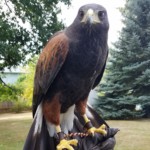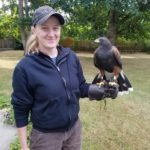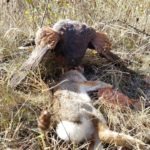Before deciding to make the leap and become a falconer I had to figure out what it really means to be one. How does one become a falconer? What does it take to remain a falconer? What do you get to do? What do you have to do?
What is Falconry?
Falconry is caring for and training raptors for pursuit of wild game, and hunting wild game with raptors. Falconry includes the taking of raptors from the wild to use in the sport; and caring for, training, and transporting raptors held for falconry. (50 CFR § 21.3)
To hunt with a hawk or falcon, you must follow all of the normal hunting regulations (including hunting licenses and tags), and also follow all of the falconry-specific laws and regulations. Falconry is a hunting sport. If you don’t want to hunt, falconry isn’t a sport for you. If you aren’t patient and fully dedicated, falconry isn’t a sport for you either.
Read, Read, Read
I read a lot of books on falconry, from guides on training, to books on making and maintaining equipment, to journals and exam manuals. Any reference that was recommended by other falconers I talked to, or showed up on more than one list of recommended readings on the falconry forums I visited I made sure to read. These were some of my sources of information as a pre-apprentice:
- Apprentice Study Guide – Holderman, F.W. (Ed.). 1998. California Hawking Club.
- Apprentice Manual – California Hawking Club.
- The Falconer’s Apprentice – Oakes, W. 1993. EagleWing Publishing, Warrens, WI.
- A Falconry Manual – (2nd edition), Beebe, F. L. 1992. Hancock House, Blaine.
- The Modern Apprentice
- Oregon Department of Fish and Wildlife
Probably the most important thing I took away from all of my research is that falconry takes TIME. You have to be prepared to spend hours per day, EVERY day, working with your bird(s). This is a huge commitment, and not one to be taken lightly.
Find a Sponsor
In order to become an apprentice falconer, I had to find a sponsor. A sponsor helps you to learn the ins and outs of falconry, and is your main support person during the two or more years of apprenticeship. I contacted the Oregon Department of Fish and Wildlife to see if there were any falconers in my area who were willing to be my sponsor. ODFW put me in contact with Kris Ebbe, a long-time raptor rehabilitation specialist turned falconer. Kris agreed to be my sponsor, and helped me to get exposure to handling raptors with her two Harris Hawks, Tauriel and Kili. She took me hunting several times before I even applied for my license so I could see what hunting with hawks was all about. I was hooked.
Take the Exam
In order to become a falconer, you have to take an exam to ensure you understand raptor biology, health, care and maintenance, safety, and all of the federal and state regulations that pertain to hunting with and handling raptors. I spent nearly 2 months preparing, and it paid off. I passed with a 96%. The minimum score to pass is 85%. I found that all of the recommended readings really helped, along with learning and understanding the laws. In Oregon, if you stay active in falconry (a minimum threshold is defined by ODFW), you do not need to retake the exam to renew your license. If you take a break for too long, you do have to take the exam again but you can be reinstated at your previous license level (Apprentice, General, or Master).
Once the exam was out of the way, and mew was constructed (more on that in another post), I was able to get the mandatory facility inspection done and apply for the license and capture permit. From passing the exam to license in hand took a few weeks, so patience and planning ahead help.
Pay All the Monies
Falconry isn’t cheap. License fees, inspection fees, capture permit fees, mew construction, equipment costs, and vet care add up…FAST. As a pre-apprentice, my recommendation would be to be prepared to invest up to $5000 to establish yourself as a falconer. I started with nothing. My equipment costs were about $1100, mew construction approximately $3000, license and permits totaled nearly $200, and the first vet visit for baseline health exam and parasite treatment was $250. Can it be done with less investment? Absolutely. But, I wanted to feel confident that I started with quality equipment, solid and safe mew facility, and preventive care to give myself the best chance of success in the long run.
Next Steps…
I will have a dedicated post to building the mew (hawk house), and acquiring all of the equipment required before becoming a falconer.



